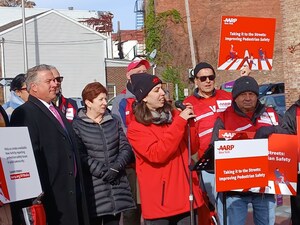AARP Warns: Projected Summer Scorcher Puts Older New Yorkers at Risk
AARP New York offers tips and advice on how older adults can stay safe & avoid life threatening heat conditions
NEW YORK, June 25, 2014 /PRNewswire-USNewswire/ -- A looming summer scorcher in New York City could prove fatal for older residents, warns AARP – the last major heat wave to hit the city claimed nearly 50 lives. The Farmer's Almanac, which all but predicted this year's brutal winter, says the New York City area can expect to be hit with an equally perilous, oppressively hot and humid summer. Today, AARP is releasing key tips and advice to help residents stay safe and cool.
In New York City alone, the last major heat wave in 2006 claimed 46 lives according to the Department of Mental Health & Hygiene. Staying cool during a blistering summer can mean the difference between life and death, as more Americans die from heat waves than all other natural disasters combined.
Older adults stand a greater risk of heat stroke or heat exhaustion because their bodies do not easily adjust to changes in temperature, making it critically important for people to check on older family, friends, or neighbors, especially those without air conditioning in their homes who accounted for more than 80% of heat stroke deaths in New York City in recent years. The HEAP Cooling Assistance program assists low-income New Yorkers with the cost of cooling their homes. To see household eligibility requirements click here or visit www.otda.ny.gov.
AARP is reminding New Yorkers to be aware of the warning signs of heat stroke, which include feeling dizzy, faint or nauseous, and experiencing cramping in the arms or legs. A person's pulse may be fast and weak, and their body temperature will be above normal. Body temperatures above 103 degrees can lead to death or permanent damage to the brain and other organs.
Symptoms of heat-related illness can be slow to develop and often the person is unaware that they are in any danger.
To combat heat-related illness, AARP New York recommends older adults:
- Stay indoors and in an air-conditioned environment as much as possible.
- Plan strenuous outdoor activities for early or late in the day when temperatures are cooler.
- Take frequent breaks when working outdoors.
- Drink plenty of fluids but avoid beverages that contain alcohol, caffeine or a lot of sugar.
- Eat more frequently but make sure meals are balanced and light.
- Check frequently on people who are elderly, ill or may need help. If you might need help, arrange to have family, friends or neighbors check in with you at least twice a day throughout warm weather periods.
- Salt tablets should only be taken if specified by your doctor. If you are on a salt-restrictive diet, check with a doctor before increasing salt intake.
- If you take prescription diuretics, antihistamines, mood-altering or antispasmodic drugs, check with a doctor about the effects of sun and heat exposure.
- Cover windows that receive morning or afternoon sun. Awnings or louvers can reduce the heat entering a house by as much as 80 percent.
- Wear a wide-brimmed hat, sun block and light-colored, loose-fitting clothes when outdoors.
- At first signs of heat illness (dizziness, nausea, headaches, muscle cramps), move to a cooler location, rest for a few minutes and slowly drink a cool beverage. Seek medical attention immediately if you do not feel better.
- Avoid extreme temperature changes. A cool shower immediately after coming in from hot temperatures can result in hypothermia, particularly for elderly or very young people.
If the power goes out or air conditioning is not available:
- If air conditioning is not available, stay on the lowest floor out of the sunshine.
- Ask your doctor about any prescription medicine you keep refrigerated. (If the power goes out, most medicine will be fine to leave in a closed refrigerator for at least 3 hours.)
- Keep a few bottles of water in your freezer; if the power goes out, move them to your refrigerator and keep the doors shut.
- Find a local cooling center such as a library or senior center. Call your local town government or visit their website to find where the centers are located. In New York City, call 311 or visit www.nyc.gov.
Follow us on Twitter: @AARPNY and Facebook: AARP New York
AARP is a nonprofit, nonpartisan organization, with a membership of more than 37 million, that helps people turn their goals and dreams into real possibilities, strengthens communities and fights for the issues that matter most to families such as healthcare, employment and income security, retirement planning, affordable utilities and protection from financial abuse. We advocate for individuals in the marketplace by selecting products and services of high quality and value to carry the AARP name as well as help our members obtain discounts on a wide range of products, travel, and services. A trusted source for lifestyle tips, news and educational information, AARP produces AARP The Magazine, the world's largest circulation magazine; AARP Bulletin; www.aarp.org; AARP TV & Radio; AARP Books; and AARP en Español, a Spanish-language website addressing the interests and needs of Hispanics. AARP does not endorse candidates for public office or make contributions to political campaigns or candidates. AARP Foundation is an affiliated charity of AARP that is working to win back opportunity for struggling Americans 50+ by being a force for change on the most serious issues they face today: housing, hunger, income and isolation. AARP has staffed offices in all 50 states, the District of Columbia, Puerto Rico, and the U.S. Virgin Islands. Learn more at www.aarp.org.
SOURCE AARP New York
WANT YOUR COMPANY'S NEWS FEATURED ON PRNEWSWIRE.COM?
Newsrooms &
Influencers
Digital Media
Outlets
Journalists
Opted In





Share this article